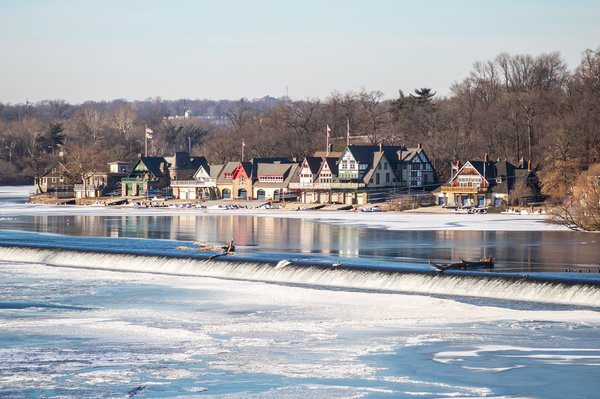A blast of Arctic air will give the Philadelphia region a particularly cold start to the year.
Temperatures are forecasted to dip slightly below normal this weekend, with highs in the 30s and lows in the mid-20s, when the cold air begins blowing in from Canada. But the mercury particularly will plummet next week, with temperatures possibly falling into the single digits during the weekend of Jan. 10-12 and beyond, forecasters say.
MORE: Despite recent rain and snow, drought conditions persist as driest year since 2016 comes to a close
"Heading into (that) weekend or even early the following week, we'll keep getting basically these reinforcing shots of Arctic air across much of the eastern United States," said Alex Staarmann, a meteorologist at the National Weather Service.
This is caused by a strong, high pressure center – a type of blocking pattern – that pushes Arctic air into the United States. Just how frigid the weather will get remains to be seen, but Staarmann said he expects at least a week with temperatures that are 10 to 20 degrees less than what's typical at this time of year.
In Philadelphia, the average high temperature in January is 41 degrees; the average low temp is 28 degrees. But when the Arctic blast hits, Staarmann said highs will be 25-to-35 degrees and lows will be in the teens or lower for several days.
"Given the air mass and the winds that'll be in place, we could certainly see wind chills near or possibly even below zero at some points, which starts getting kind of unusual for our area to have below zero wind chills," Staarmann said. "So, definitely could be a very cold period."
Though the temperatures will be chilly enough for a snow, there's no guarantee. Staarmann said the air blast, which originated in Siberia, could be so large and strong that it suppresses storm tracks. Storms could be pushed farther south, diverting snow away from the Northeast.
Still, the cold temperatures are not expected to be low enough to break any records, Staarmann said. The last time the temperature in Philadelphia dipped into the single digits was December 2022, when it was 7 degrees on Christmas Eve. What's odd is the duration — Staarmann said it's been at least five years since the region saw such a long duration of below-normal temperatures. In late 2017 and early 2018, Philadelphia had 14 straight days in which the temperature never rose above freezing.
"We typically get a couple of cold snaps every winter where it gets fairly cold, but with these types, usually it might last a day or two, maybe three, and then it starts warming up again," Staarmann said. "But this one could last a week or more, so that's the unusual nature of it."
The length of the cold spell could cause an issue for infrastructure, Staarmann said. Demand for heat and electricity may strain the electrical grid. Pipes that typically hold up during short cold snaps may freeze or burst.
When that happens, local governments typically step in to offer emergency assistance and activate shelters. Montgomery County has declared a Code Blue for Jan. 1-6 and recommends people fill their tanks with gas, and check smoke and carbon monoxide detectors. Philadelphia residents can follow the city's Office of Emergency Management and Office of Homeless Services for updates.
"The idea is just prepare for a long duration of much below-normal temperatures," Staarmann said. "If people have any vulnerable pets or loved ones, be sure to check up on them, make sure they have heating and supplies they need."

